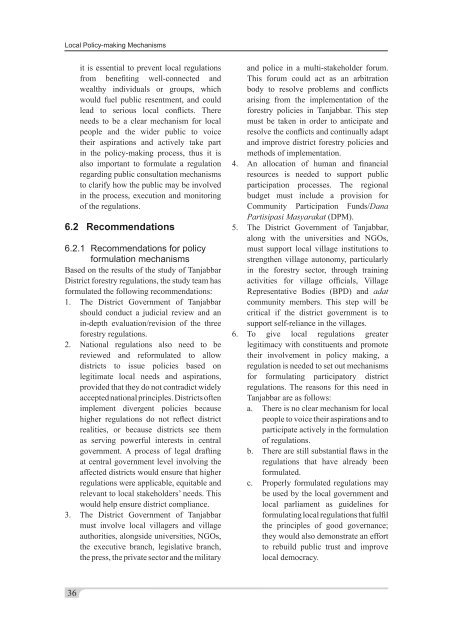Local policy-making mechanisms - Forest Climate Center
Local policy-making mechanisms - Forest Climate Center
Local policy-making mechanisms - Forest Climate Center
You also want an ePaper? Increase the reach of your titles
YUMPU automatically turns print PDFs into web optimized ePapers that Google loves.
<strong>Local</strong> Policy-<strong>making</strong> Mechanismsit is essential to prevent local regulationsfrom benefiting well-connected andwealthy individuals or groups, whichwould fuel public resentment, and couldlead to serious local conflicts. Thereneeds to be a clear mechanism for localpeople and the wider public to voicetheir aspirations and actively take partin the <strong>policy</strong>-<strong>making</strong> process, thus it isalso important to formulate a regulationregarding public consultation <strong>mechanisms</strong>to clarify how the public may be involvedin the process, execution and monitoringof the regulations.6.2 Recommendations6.2.1 Recommendations for <strong>policy</strong>formulation <strong>mechanisms</strong>Based on the results of the study of TanjabbarDistrict forestry regulations, the study team hasformulated the following recommendations:1. The District Government of Tanjabbarshould conduct a judicial review and anin-depth evaluation/revision of the threeforestry regulations.2. National regulations also need to bereviewed and reformulated to allowdistricts to issue policies based onlegitimate local needs and aspirations,provided that they do not contradict widelyaccepted national principles. Districts oftenimplement divergent policies becausehigher regulations do not reflect districtrealities, or because districts see themas serving powerful interests in centralgovernment. A process of legal draftingat central government level involving theaffected districts would ensure that higherregulations were applicable, equitable andrelevant to local stakeholders’ needs. Thiswould help ensure district compliance.3. The District Government of Tanjabbarmust involve local villagers and villageauthorities, alongside universities, NGOs,the executive branch, legislative branch,the press, the private sector and the militaryand police in a multi-stakeholder forum.This forum could act as an arbitrationbody to resolve problems and conflictsarising from the implementation of theforestry policies in Tanjabbar. This stepmust be taken in order to anticipate andresolve the conflicts and continually adaptand improve district forestry policies andmethods of implementation.4. An allocation of human and financialresources is needed to support publicparticipation processes. The regionalbudget must include a provision forCommunity Participation Funds/DanaPartisipasi Masyarakat (DPM).5. The District Government of Tanjabbar,along with the universities and NGOs,must support local village institutions tostrengthen village autonomy, particularlyin the forestry sector, through trainingactivities for village officials, VillageRepresentative Bodies (BPD) and adatcommunity members. This step will becritical if the district government is tosupport self-reliance in the villages.6. To give local regulations greaterlegitimacy with constituents and promotetheir involvement in <strong>policy</strong> <strong>making</strong>, aregulation is needed to set out <strong>mechanisms</strong>for formulating participatory districtregulations. The reasons for this need inTanjabbar are as follows:a. There is no clear mechanism for localpeople to voice their aspirations and toparticipate actively in the formulationof regulations.b. There are still substantial flaws in theregulations that have already beenformulated.c. Properly formulated regulations maybe used by the local government andlocal parliament as guidelines forformulating local regulations that fulfilthe principles of good governance;they would also demonstrate an effortto rebuild public trust and improvelocal democracy.36

















